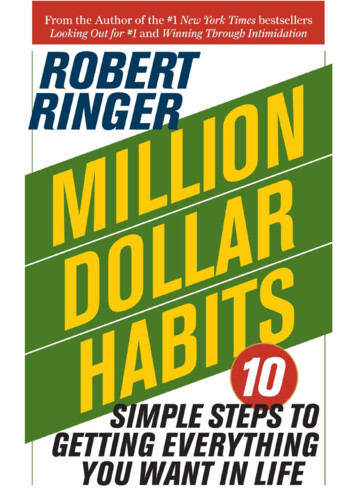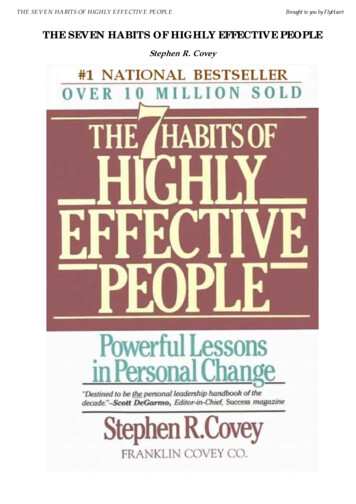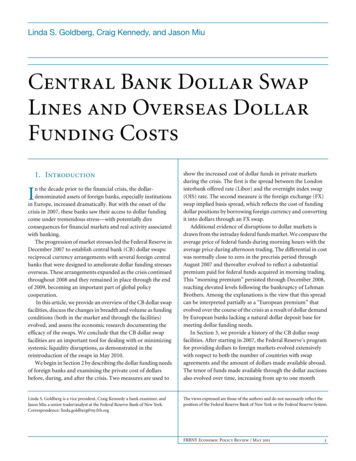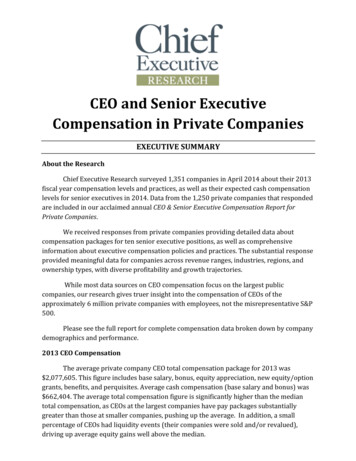
Transcription
Mi l l i on Dol l ar Hab i tsMillionDollarHabits2
Mi l l i on Dol l ar Hab i tsRobertRingerwww.robertringer.com3
Mi l l i on Dol l ar Hab i tsCopyright 2014 by Robert RingerAll rights reserved. No part of this book may be reproduced in anyform whatsoever, stored in a retrieval system, now known or to beinvented, or transmitted in any form or by any means, electronic,mechanical, photocopying, recording, scanning, or otherwise,without the prior written permission of the author or publisher.Manufactured in the United States if America.4
Mi l l i on Dol l ar Hab i tsTO MY FAMILY5
Mi l l i on Dol l ar Hab i tsContentsIntroductionChapter 1THE REALITY HABITChapter 2THE ATTITUDE HABITChapter 3THE PERSPECTIVE HABITChapter 4THE PRESENT LIVING HABITChapter 5THE MORALITY HABITChapter 6THE HUMAN RELATIONS HABITChapter 7THE SIMPLICITY HABITChapter 8THE DRAIN PEOPLE ELIMINATION HABITChapter 9THE SELF-DISCIPLINE HABITChapter 10 THE ACTION HABIT6
Mi l l i on Dol l ar Hab i ts7
Mi l l i on Dol l ar Hab i tsPREFACEOne of the most frequent questions directed at me in seminars is,"Knowing what you know today, would you change anything in yourearlier books if you had the opportunity to do so?" What a question.Of course I would. It's like asking me if I'm dead or alive."We're all on our way to learning more," declared Don Shimoda,Richard Bach's messiah in Illusions. It would be difficult, if notimpossible, for a person to learn and grow, yet remain static in his*thinking. While I haven't exactly become a card-carrying communistor self-immolating monk, I do continually strive to refine my basicphilosophy.An even tougher question with which someone recently confrontedme was, "How would you define your occupation?" Interestingquestion, and one which, remarkably, had never before crossed mymind. After pondering for about twenty seconds, I answered, "I'm inthe business of trying to make sense out of life and communicatingmy conclusions to others in the simplest possible manner." By atleast one definition, I guess that makes me a philosopher, because aphilosopher is someone who thinks in an effort to make sense out oflife.What a great profession. Why work for a living when you can getaway with thinking and typing all day? Of course, you risk goinginsane in the process, though I was fortunate enough to avoid such afate until I moved to Los Angeles. (It was none other than Freudhimself who warned people like me, "The moment one inquires aboutthe sense or value of life, one is sick.") Still, in all, you know it's worthit when you check the classifieds and see what supermarkets arepaying bag boys.8
Mi l l i on Dol l ar Hab i tsThis book is a pretty accurate snapshot of where my thoughtevolution has taken me to date. To pick up my trail, just follow thepath marked Bumps, Bruises, and Scars. If you keep your eyes andmind open and move briskly, you may even avoid a number of pitfallsalong the way.*Wherev er the neuter is not used in this book, the m asculine gender isem ploy ed for conv enience purposes only . It has no other im plications,im plied or otherwise.9
Mi l l i on Dol l ar Hab i ts10
Mi l l i on Dol l ar Hab i tsINTRODUCTIONThe first major premise of this book is that success is not dependentupon one's being blessed with superior intelligence or special skills,nor does formal education, hard work, or luck play a major role in anindividual's climb toward success. The world is saturated withintelligent, highly educated, extraordinarily skilled people who areperpetually frustrated because of their lack of success. Likewise,millions of others spend their lives working hard, long hours, only todie broke.As to breaks, they float in and out of people's lives every daywithout being exploited or, in most cases, even noticed. You'veundoubtedly known someone who has been the recipient ofinordinately good luck, yet failed to achieve any significant degree ofsuccess. Heirs to large fortunes who are grossly unhappy, or whohave lost their entire inheritances through reckless or irresponsiblebehavior, are classic examples of this sad phenomenon.The second major premise of this book is that the differencebetween success and failure is not nearly as great as most peoplebelieve. Having personally experienced both major success andfailure, I can state with confidence that the difference between thetwo is, in fact, quite slim.The erroneous notion that there is a major difference between theactions of successful and unsuccessful people causes millions ofindividuals to cling to the mistaken belief that success is the result ofbeing privy to some tenaciously guarded, mysterious secret. In theevent you share this belief, I urge you to let go of it. I can absolutelyassure you that there is no big secret to success.Which leads me to the third and final major premise of this book:11
Mi l l i on Dol l ar Hab i tsSuccess is matter of understanding and religiously practicing specific,simple habits that always lead to success. While this may not soundparticularly glamorous at first blush, there are two realities that makeit quite an exciting proposition: First, it works. Second, habits can bedeveloped by anyone who is willing to put forth the necessary effort.Remember, life is nothing more than the sum total of manysuccessful years; a successful year is nothing more than the sum totalof many successful months; a successful month is nothing more thanthe sum total of many successful weeks; and a successful week isnothing more than the sum total of many successful days. That's whypracticing simple success habits day in and day out is the most certainway to come out on top over the long term.Put in metaphorical terms, success is not a grand-slam home run.Rather, it's a matter of consistently hitting singles and doubles day inand day out. The individual who makes it to the top concentrates onstaying at bat and avoiding the big mistake. Then, when that perfectpitch comes across the plate, he hits it out of the park.The important principle to grasp is that if you don't keep hittingthose singles and doubles every day, you may not have theopportunity to hit a home run when that perfect pitch finally arrives.In other words, you can't coast. You've got to do it every day.The title Million Dollar Habits is a euphemism for habits that leadto positive results. Everyone gets results, regardless of the nature ofhis actions. A bank robber gets results. A person who refuses to workand goes on welfare gets results. An individual who is inconsiderateand rude gets results. But none of these people get positive results.So keep in mind that whenever I allude to results in this book, I'mtalking about results that are in your long-term best interest.One final note: Though the habits I discuss in this book arerelatively simple, I don't mean to suggest that it takes no effort onyour part to acquire and practice them. I never try to sell easy. I sell12
Mi l l i on Dol l ar Hab i tswhat I perceive to be truth.13
Mi l l i on Dol l ar Hab i ts14
Mi l l i on Dol l ar Hab i tsChapter 1THE REALITY HABITReality is the foundation for every other success habit, so in order forthe ideas, strategies, and information that I discuss in this book to beof maximum benefit to you, it's crucial that you develop the RealityHabit. Except for an occasional accident of fate, positive resultsrarely find their way to people who harbor a faulty perception ofreality. While many of the points in this chapter may seem obvious toyou, that in itself can create a subtle barrier, because human beingshave a tendency to ignore the obvious. Intellectually, we may agreewith a point that's apparent, but when it comes time to take action, weoften suppress our intellect and allow our emotions to guide us.I use the word emotions because reality is an issue that people tendto get very emotional about. The problem is that reality is nothingmore than truth, and as Baltasar Gracian, the insightful and pragmaticseventeenth-century Jesuit priest, cautioned, "Truth is abhorred bythe masses." Instead, they try to make true that which they love—aself-delusive practice that virtually guarantees frustration andfailure.Unfortunately, most people live in an unreal world; i.e., they createa world in their own minds based on the way they would like it to berather than the way it actually is. At one time or another, all of usseem to adopt the philosophy of humorist Ashleigh Brilliant, whoonce remarked, "I have abandoned the search for truth, and am nowlooking for a good fantasy."15
Mi l l i on Dol l ar Hab i tsPeople often say things like, "But this is my reality. Reality isdifferent for each person." Wrong. Reality is precisely the same foreveryone. There is only one reality. What differs is each person'sperception of reality. By perception, I am referring to the ability tocorrectly interpret the events that surround you, to be able to graspthe difference between what is real and what is unreal, between factand fiction, between what works and what doesn't work. A faultyperception of reality is almost always destructive and sometimesfatal.It's absolutely essential that a person intellectually and emotionallyunderstands that reality isn't the way he wishes things to be or theway they appear to be, but the way they actually are. The person whois not able to make this distinction finds it virtually impossible tomake decisions that lead to positive results.PrinciplesAs used in this chapter, a principle is synonymous with a law ofnature, as opposed to a law of man. Most man-made laws are nothingmore than legalized aggression against the sovereignty of peacefulindividuals and rarely bear any relationship to Natural Law, reality,or morality. A man-made principle, such as Parkinson's Law, is not atrue principle in the sense of being an immutable law. It is simply anobservation of a human tendency. In the case of Parkinson's Law, it'smerely our firsthand observations that lead us to concur thatexpenses tend to increase as income rises.The most significant quality of a true principle of nature is that itcan neither be created nor altered. The problem arises when peoplerefuse to accept the reality that principles can only be discovered andinsist on believing they can create their own principles.Take the principle of gravity, for example. Isaac Newton didn't16
Mi l l i on Dol l ar Hab i tswake up one morning and decide to create a principle whereby if hedropped an apple from a tree twenty times, it would fall to the groundnineteen times and go up once. Ridiculous, of course. Instead,through experimentation, he discovered that if you drop an applefrom a tree twenty times, it will fall to the ground twenty times. Whathe did was discover the principle, or law, of gravity.A principle, then, is the essence of reality. It is what it is, and it's upto us to discover it. To try to create our own reality is both futile anddestructive. You certainly have the right to go on believing whateveryou wish to believe, but reality isn't discriminatory. It will mete outnegative consequences just as harshly to the well-meaning, ignorantindividual as to the malevolent, stubborn person. Not once hasreality excused anyone for good motives, so consistency is essentialwhen it comes to a proper perception of reality.T he Foundational Principle of SuccessThere are an infinite number of natural laws to be discovered, but,fortunately, you don't need a detailed understanding of every one ofthem to achieve even the most grandiose of goals. However, there isone law with which you must be totally familiar and that you mustunfailingly use as a guide in all your dealings. The law I'm referring tois the ultimate, immutable law of nature, the foundation of realityitself: Actions have consequences.If I push you (an action), something must happen; i.e., there mustbe a consequence. You may fall down, you may stumble, or, at thevery least, you will feel pressure against your body. You may also getmad at me, walk away, or push me back. The point is that I cannotescape the reality that my action, no matter how small, will haveconsequences. Where I start to invite problems into my life is when Idelude myself into believing that I can push you without there beingany consequences. Every action that you and I have ever taken has,17
Mi l l i on Dol l ar Hab i tssooner or later, brought about a consequence.In physics, we learn that for every action there is an equal andopposite reaction. The longer I live, however, the more convinced Iam that in the daily process of living (as opposed to the science ofphysics), reactions tend to be greater than the actions that provokethem.Whenever we act irresponsibly or dishonestly, the"punishment" seems to be way out of proportion to the "crime." Myexperience has been that I almost always end up paying for anirresponsible action over and over again, with each payment seemingto take the form of a balloon note carrying onerous, compoundedinterest.The consequence may take a long time, and it may be indirect orsubtle in nature, but there is always a consequence. Symbolicallyspeaking, everything you do goes into your book of life. This doesn'tnecessarily hold a religious connotation, but I do firmly believe thatuniversal forces are at work that pull us inexorably toward thedeserving results of our actions. Kindness begets kindness; crueltybegets cruelty.Where many people allow themselves to be misled is that thepayback for their actions is not always immediate, which results intheir failing to make the connection when it finally arrives. Or, evenwhen the consequence is prompt, they may miss the subtlety of theconnection between the result and their preceding, causal action.Though most people believe the inherent truth of the principle ofActions Have Consequences, I am also convinced that few of themgive it more than passing thought as they go about their daily affairs.The question is, why would people ignore such an all-powerful,immutable principle?A World of Delusions18
Mi l l i on Dol l ar Hab i tsTo paraphrase Robert DeRopp, man inhabits a world of delusions,which obscures reality and creates dangers for himself and others.He rarely understands what he is doing or why he is doing it. Hisactions and beliefs indicate that he lives in a state of waking dreams.When it comes to one individual deluding another, the mostobvious motivation is personal gain. In some cases, the delusioninvolves deceit (clandestine in nature); in others, honestoverzealousness (innocent in nature). But regardless of the intent,the consequences are the same: The person is deluded into believingsomething that isn't true. Thus, he is persuaded to ignore reality andaccept an untruth in its place.In addition to being deluded by others, there also is the problem ofself-delusion. The results of this destructive practice can bedevastating, ranging from mental illness to financial failure to war.Therefore, anyone serious about achieving positive results mustdevelop the habit of carefully examining his own premises and beliefsto make certain he is not feeding himself a diet sprinkled too heavilywith the spice of self-delusion.The first step toward developing the Reality Habit, then, is totranscend our world of delusions. Delusions infest every area of life;there are no exceptions. Take the advertising business, which is theultimate world of delusions. One might justifiably conclude that thesuccess of most advertising is directly related to the degree to whichit is able to delude the viewer, listener, or reader.Most ads today are so ridiculous that you wonder how anyonecould possibly be stupid enough to take them seriously. Butobviously a lot of people do take them very seriously or companieswouldn't keep running the same idiotic ads over and over again.Advertising agencies are delightfully aware that man inhabits a worldof delusions, and that it's in their financial best interests to keepfeeding those delusions so customers will continue buying theirproducts.19
Mi l l i on Dol l ar Hab i tsIf you want to operate a successful advertising agency, you mustremember the proven, delusionary rules of the game. For example,to sell beer, show scenes of yuppies playing touch football on thebeach, jocks saying and doing illiterate things, or hardhats engaging insuch intellectual activities as welding, bulldozing, or temperingmolten steel. To sell liquor, show sensual women and handsome menin tuxedos hanging around fireplaces. To sell hamburgers, showfrolicking adults and children who, for no apparent reason, are giddywith laughter.People want to smell better, look better, feel better, be moresensual, work less, make more, and play more. But the reality is thatpeople don't need beer; they don't need more greasy fries andburgers; and they certainly don't need pickup trucks that can go fromzero to 150 miles an hour in three seconds. So what do advertisers doabout this lack of need? They cleverly sell their products under theguise of what people want. Try to sell people what they need, andyou're liable to end up in bankruptcy court.On the other hand, your success is very much dependent upon yourcommitment to develop the habit of not straying too far from reality,so you don't become a victim of such delusions.Fear of T ruthClear back in 1982, I remembering writing an article about thecoming real estate collapse, which was becoming increasingly evidentat the time. In the article, I said I first began to sense a collapse wason the horizon when I heard a famous real estate guru speak at afinancial seminar in the summer of 1980. In response to his ownrhetorical question about when the real estate bust was going tooccur, he said, with a self-assured air of finality, "Ladies andgentlemen, there's no bust. There is no bust. We have a temporarylull in the market."20
Mi l l i on Dol l ar Hab i tsI didn't mention his name at the time, because I was not interestedin undermining the man or debating him. I was simply astonishedthat a seemingly intelligent individual would make such a naïvestatement, presumably knowing the facts not only about real estatebubbles, but about the history of investment bubbles in general. Theharsh reality is that, sooner or later, every investment bubble bursts.Five years later, in May 1987, the real estate wizard who made thatbrash statement filed for voluntary bankruptcy, listing assets ofabout 1 million and liabilities of nearly 3 million. I'm not one tokick a man when he's down, which is why I'm not mentioning hisname. My only purpose here is to point to his unfortunate downfallas a warning to others to be ever vigilant about falling into the trap ofself-delusion.What happens to most of us at one time or another is that webecome so caught up in our own hype about our projects that wesimply refuse to acknowledge any facts that fly in the face of ourdesires. Never forget that human beings, by and large, do not want tohear truth; rather, they try to make true that which they love. Whoneeds truth if it's going to put you out of business? We would muchrather delude ourselves by simply ignoring the facts, even if we onlysucceed in prolonging the inevitable. Unfortunately, by so doing, wealso guarantee disastrous long-term results.T he Something-for-Nothing UrgeThe something-for-nothing urge can be seen in what I like to refer toas "the turkey markets"—the Vancouver Turkey Market, the DenverTurkey Market, and the Salt Lake City Turkey Market, to name a fewof the more prominent ones. The turkey markets are where "pennystocks" are traded.I've often said that if the slickest Wall Street trader came to Salt21
Mi l l i on Dol l ar Hab i tsLake City to ply his trade, he would have to find a new line of work.Turkey market promoters have angles that wouldn't even cross themind of the most lecherous trader on Wall Street, and gall thatstretches the most larcenous of imaginations. The only reason noone's ever done a movie about the turkey markets is that moviegoerswould think the story was too farfetched.The turkey markets comprise a big game of musical chairs, with thepromoters of every penny stock promising to bail out their relativesand pals at a profit as soon as the next level of turkeys buy in. Ofcourse, we all know what happens to turkeys in the end. The onlyquestion is which ones will be left holding the fowl certificates whenthe music stops and there are no more buyers to be found?A couple of years ago, when I was in New Orleans on a speakingengagement, a friend invited me to dinner with a large group ofpeople at a plush restaurant. I was seated next to a middle-agedattorney who not only loved to talk, but also was quite inebriated (theabsolute worst of all possible combinations, and just one of the manyreasons why I don't drink anymore).As the evening progressed and he continued to confide in me aboutone sordid deal after another in which he was involved, he begantalking about a penny-stock deal that he and his cronies had recentlyput together. As he babbled on, he kept winking and poking me withhis elbow, which I misinterpreted to be uncontrollable twitches.Finally, I realized that a wink or elbow in Cajun meant, "Y'all get whatah'm sayin', ah hope."Nervously, I began winking back and nodding my head up anddown. I managed to force a smile whenever I thought my newlyfound confidant was expecting one, and, while focusing on hisfascinating verbiage, succeeded in getting a significant portion of mymeal on my suit, white shirt, and tie. Finally, the attorneysimultaneously gave me a super-duper wink and elbowing, and, with asinister chuckle, mumbled something about "and when the stock hits22
Mi l l i on Dol l ar Hab i tsthe right price, the lil' old ladies end up holdin' the bag."Ignorantly, I asked, "How do you know the price will go up? Whatdoes the company do? Is it profitable?"The attorney looked at me with a grin that suggested he thought Iwas jesting, and replied, "Frien', what the company does, how much itmakes or loses, and what its prospects are has nuthin' whatsoever todo with the price of the stock. The price is whatever we say it is. Allwe gotta' do is open the gates when the price is right, let the lil' oldladies in, and the rest is history."Of course, "lil' old ladies" is just a euphemism for anyone delusionalenough to invest in the penny stock of a company with no trackrecord and no perceivable future. I never cease to be amazed at theseemingly endless pool of prospective new buyers, no matter howmany 60 Minutes-type stories air on television about penny-stockscams. Only a force as mighty as self-delusion—self-delusion basedon the all-powerful, something-for-nothing urge—could make itpossible for such absurd scams to continue unabated.I found out about the realities of the penny-stock game the hardway when, in my youth, I became involved in a "public shell." Inaïvely believed I could build the company into a legitimatemoneymaking enterprise, but the promoters of the stock had otherideas. Shortly after I jumped into the water, they began hounding meto "do something" (such as make a glitzy announcement toshareholders about the prospects of the company) to aid them inraising the price of the stock.When I steadfastly refused, they became irate and threatened to letthe stock freefall. After a time, they realized I was not going to budgeand, sure enough, they made good on their threat. The result was aquick and merciful burial for the company and, thankfully, an equallymerciful end to a most distasteful and unpleasant experience for me.23
Mi l l i on Dol l ar Hab i tsNow, you might argue that buying a penny stock isn't really thefault of the purchaser, but, rather, the people who mislead him withfalse hype about the stock in question. It's important to understand,however, that such promotions wouldn't be possible were it not forthe fact that people's greed motivates them to want to be deluded.They practically cry out to the scammers, "Lie to me, please lie tome." And, rest assured, there's never a shortage of blue-suede shoersaround to oblige them.If you wanted to be perverse, you might even suggest that shadypenny-stock promoters provide a valuable service by telling peoplewhat they want to hear and, in the process, bursting their naïve, selfdelusionary bubbles. (Hmm . that really is perverse, isn't it?)Regardless, the desire for something for nothing, if not kept undercontrol, can develop into a serious case of self-delusion andcompletely separate an otherwise rational human being from the realworld. It is therefore prudent to practice the habit of doublechecking your premises before entering into any financial deal,making certain that you aren't being driven into it by a deep-seated,something-for-nothing urge.Delusions of GrandeurA good example of the destructiveness of having delusions ofgrandeur in the business world is when a person deludes himselfabout what he brings to the table in a negotiating situation. Theperson who makes this kind of mistake often ends up walking awayempty-handed. If you don't have a realistic grasp of what the value ofyour contribution to a deal is, one of the most likely consequences isthat serious people may refuse to deal with you.At worst, you can get yourself into a catch-22 situation if theperson you're negotiating with thinks your proposal is absurd. That24
Mi l l i on Dol l ar Hab i tsis, in order to keep him from walking away from the deal, you mighthave to back down substantially, in which case the other party islikely to wonder just how much farther you might be willing to backdown. And when that occurs, it puts him firmly in the driver's seat,because you've lost any semblance of posture you may have had atthe outset of the negotiations.The EgohulksterThe ultimate when it comes to delusions of grandeur can be seen inthe Egohulkster, the guy who spends most of his time, energy, andmoney trying to convince himself and others that he's thereincarnation of Andrew Carnegie. A classic tip-off that you'redealing with an Egohulkster is lavish offices with all the trappings.Little does he know that this kind of flash serves as a red flag toexperienced, savvy entrepreneurs, particularly if the growth of hisbusiness has been unusually fast.I remember a number of years back having dinner with anEgohulkster in his early thirties, the purpose of which was to discuss abusiness deal we were in the process of negotiating. We never did getaround to talking business because he spent so much time yappingabout who he knew, how much he made, and how clever he was. Atone point, apparently sensing (erroneously) that his prey'sfascination had reached a fever pitch, he blurted out, "There arethree things I can do around the clock—drink, gamble, and have sex."I'm telling you, I nearly yawned.Then, with trumpets blaring inside his arthritic brain, he went on todescribe his awesome dealmaking exploits, taking care to emphasizethat he regularly flitted from coast to coast on his own Learjet.Though it all sounded very impressive, when I happened to talk toone of his business associates about six months later, I was notsurprised to hear that he had gone belly up.25
Mi l l i on Dol l ar Hab i tsReal-World Rule No. 52: Distrust anyone under fortywith a Learjet! Years ago, I remember my nephew, who at the timewas a novice stock broker working for an establishment brokeragefirm, saying to me, "Uncle Robert, I can't believe it. The biggest guysin the firm cheat their own clients." I smiled and assured him that hehadn't exactly discovered the Theory of Relativity. Nevertheless,self-delusion prompted by naïveté abounds among amateur stockmarket players. (An amateur stock market player is defined as anyperson who isn't involved in the stock market on a full-time basis, yetinsists on "investing" in stocks.)Let me make it clear that I'm not talking about so-called insidertrading. In fact, I don't believe there is such a thing as insidertrading. Insider trading is nothing more than a figment of a bunch ofregulators' imaginations. In the vague sense that the term is normallyused, virtually everyone who buys stocks is guilty of insider trading.That's because all buyers, including mythical little old ladies, buystocks based on tips (stated or implied) that someone (usually abroker) gives them about those stocks.So what are the heavyweight market players who end up in prisonguilty of? The question in itself is naïve. They are, of course, guiltyof ferreting out better tips! Our modern world of materialism isfueled by envy, and when you dare to play the game better thanothers, you run the risk of going to prison. My point is that, whilethere's nothing wrong with dabbling in the stock market, one must becareful not to delude himself about the realities of the game—and therealities can be pretty brutal. The guys who make big money in themarket are smart, quick, and ruthless, so caveat emptor.Developing a Correct Perception of RealityThe purpose of the above examples was to reinforce the point that26
Mi l l i on Dol l ar Hab i tsmajor success comes only to those who develop the habit of avoidingthe temptation to embrace a world of delusions. Make no mistakeabout it, this is a difficult task. The truth can often be harsh, and, ashuman beings, we quite naturally gravitate toward less pain and morepleasure. We don't like our little delusionary worlds to be upset.However, if at times it seems inordinately difficult to refrain fromembracing delusions, it's useful to remember an important principleassociated with the law of Actions Have Consequences: The higherthe price, the greater the benefit. The cost of a sound perception ofreality is high, because the better your grasp of reality, the better thequality of your results; and the better the quality of your results, thebetter the quality of your life. Thus, one of the most commonreasons that so few people are able to consistently achievemeaningful
The title Million Dollar Habits is a euphemism for habits that lead to positive results. Everyone gets results, regardless of the nature of his actions. A bank robber gets results. A person who refuses to work and goes on welfare gets results. An individual who is inconsiderate and rude get










